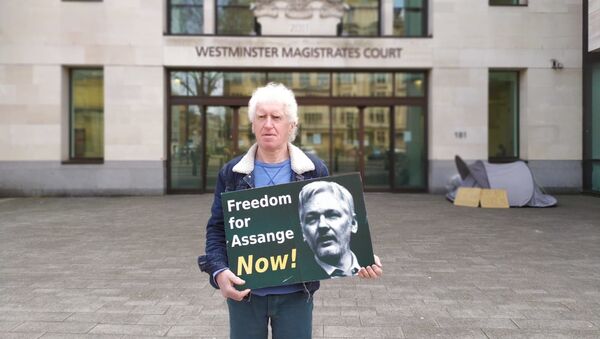The judge in Julian Assange's extradition hearing decided on 7 April that she was lifting the temporary reporting restrictions preventing anyone from divulging the identity of his partner.
— @MartySilk (@MartySilkHack) April 7, 2020
One of Assange's lawyers, Mark Summers QC, vowed to appeal with the High Court challenging the decision not to grant anonymity to Assange's partner. For that reason, it was agreed between the defence, the US government, and the judge that reporting restrictions would be re-imposed until the matter of the appeal is resolved.
On 25 March, Baraitser decided that there were not strong enough grounds to grant anonymity to Assange's partner. The WikiLeaks founder's partner, only referred to as AA by the defence team, filed a witness statement in support of the Assange's emergency bail application.
Edward Fitzgerald QC put it to the judge that she had the legal authority to grant anonymity to Assange's partner, even though they were not claiming that she was at risk of harm should her name be revealed. The defence did argue that Assange's partner, and their children, were under significant risk of having their Article 8 right to a private and family life disproportionately interfered with. They said given the nature of the case, the risk of harassment was too great, especially given the evidence that the CIA obtained DNA samples from the children's nappies when AA visited Assange at the Ecuadorian Embassy, where he had received asylum. The court, US government, and defence all already know the identity of Assange's partner.
Although Baraitser did not find that the facts of the case warranted a deviation from normal procedure, which is one of "open justice", she did place a temporary reporting restriction until the case management hearing on 7 April. At the 7 April hearing, Baraitser outlined in detail the reasons behind her decision not to grant anonymity and concluded that the reporting restrictions could no longer be justified as a matter of law.
— @MartySilk (@MartySilkHack) April 7, 2020
But because Summers notified the court of the defence's intention to file an emergency appeal, the judge ultimately agreed to reimpose the reporting restrictions. Under these restrictions, any member of the public or press who reveals the identity of Assange's partner, their children, or any information which could reasonably lead to their identities being revealed, would be committing an offence under the Contempt of Court Act. The prosecution did not oppose the order nor did they oppose the initial application for anonymity, saying they were "neutral" on the matter.
James Lewis QC, who acts for the US government in the case, told the court:
"We accept that as a matter of law the court has power to grant anonymity if it is in the interests of justice to do so. The starting point is open justice, then one proceeds from open justice to balance the factors presented by the defence".
During the same hearing, the judge denied an application filed by the defence to vacate the second part of Assange's substantive extradition hearings. Assange's lawyers argued that given the extreme nature of the lockdown imposed by the British government, due to the COVID-19 pandemic, it would be impossible for the defence to properly prepare their case, especially since prisons are not accepting visitors. The prosecution did not object to the defendant's application to change the date of the second set of substantive hearings.
The US government is seeking Assange's extradition to the United States, where the publisher and journalist faces up to 175 years in prison. He is charged with 18 counts of espionage-related offences for his role in publishing classified US documents that revealed, among other things, war crimes and other criminality perpetrated by American-led forces in Iraq, Afghanistan, and Guantanamo Bay, Cuba in 2010 and 2011.




